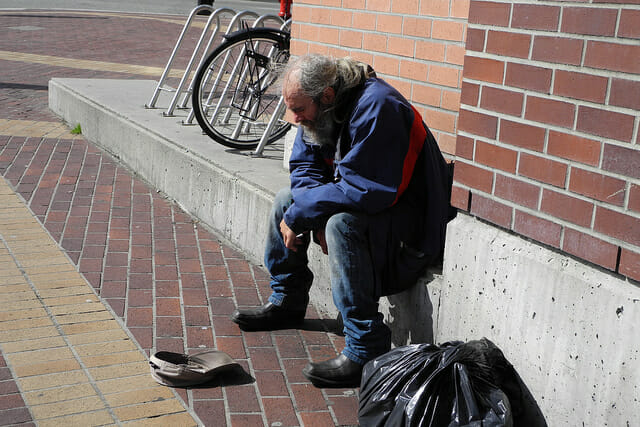People With Severe Mental Illness Die 15 to 30 Years Before Other Americans
It’s a growing issue that doesn’t receive enough attention. Mental illness is also linked to homelessness. (flightlog / Flickr Creative Commons)
Mental illness is also linked to homelessness. (flightlog / Flickr Creative Commons)
There’s a hidden factor increasing American mortality rates, one that goes beyond race, ethnicity, location or even socio-economic class. It’s the presence of serious mental illness, Dhruv Khullar reports in The New York Times’ TheUpshot blog, and it’s killing more Americans than we think.
It’s a widening gap, and one, Khullar writes, “That has been growing, but it receives considerably less academic study or public attention.”
He continues, “The extraordinary life expectancy gains of the past half-century have left these patients behind, with the result that Americans with serious mental illness live shorter lives than those in many of the world’s poorest countries.”
Khullar also challenges claims that those with mental illness more frequently die by their own hand. In fact, he writes, “they’re much more likely to die of the same things as everyone else: cancer, heart disease, stroke, diabetes and respiratory problems.”
In addition, they also tend to suffer from social isolation and poverty, and lack of access to treatment. Even when they do seek treatment, it’s often only after a long delay. Khullar believes that if the American health care system made it easier to access adequate mental health care, the mortality numbers would be much less severe.
He lays some of the blame on doctors, both for being too pessimistic that treatment will work, and also for attributing any physical systems to depression, a practice called “diagnostic overshadowing.” In that case, “when doctors know a patient has depression, for example, they’re less likely to think her headache or abdominal pain portends a serious illness.”
To alleviate the problem, Khullar points to programs that treat mental health care along with physical health care. He cites a weight loss program that taught behavioral solutions to overeating problems, and a clinic at the University of Texas at San Antonio that treats recently discharged patients with mental health issues and ensures they’re evaluated as soon as possible to avoid gaps in care.
As a doctor at the San Antonio clinic told Khullar, “With the right kind of care, people with serious mental illness can integrate back into society.” Early results from similar programs show they can live longer too.
Your support is crucial…With an uncertain future and a new administration casting doubt on press freedoms, the danger is clear: The truth is at risk.
Now is the time to give. Your tax-deductible support allows us to dig deeper, delivering fearless investigative reporting and analysis that exposes what’s really happening — without compromise.
Stand with our courageous journalists. Donate today to protect a free press, uphold democracy and unearth untold stories.






You need to be a supporter to comment.
There are currently no responses to this article.
Be the first to respond.